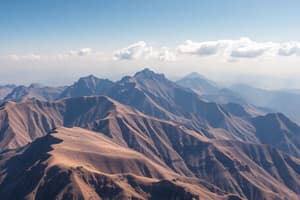Podcast
Questions and Answers
भौगोलिक स्थान के उच्चारण में स्थानीय और सापेक्ष स्थिति का क्या अंतर है?
भौगोलिक स्थान के उच्चारण में स्थानीय और सापेक्ष स्थिति का क्या अंतर है?
स्थायी स्थिति वह होती है जो सटीक समन्वय द्वारा बताई जाती है, जबकि सापेक्ष स्थिति अन्य स्थानों के सापेक्ष होती है।
भौगोलिक तकनीकों में GIS का क्या महत्व है?
भौगोलिक तकनीकों में GIS का क्या महत्व है?
GIS का उपयोग भौगोलिक डेटा को कैप्चर, स्टोर, विश्लेषण और प्रबंधित करने के लिए किया जाता है।
भौगोलिक अध्ययन में वातावरण और मानव के बीच संबंध को कैसे परिभाषित किया जाता है?
भौगोलिक अध्ययन में वातावरण और मानव के बीच संबंध को कैसे परिभाषित किया जाता है?
इसमें यह अध्ययन होता है कि मानव कैसे पर्यावरण के साथ अंतःक्रिया करते हैं और उसे किस प्रकार रूपांतरित करते हैं।
भौतिक भूगोल के अध्ययन में किन प्रक्रियाओं का ध्यान रखा जाता है?
भौतिक भूगोल के अध्ययन में किन प्रक्रियाओं का ध्यान रखा जाता है?
भूमि उपयोग और शहरी विकास में भूगोल का क्या योगदान होता है?
भूमि उपयोग और शहरी विकास में भूगोल का क्या योगदान होता है?
Study Notes
Definition of Geography
- Study of the Earth's landscapes, environments, and the relationships between people and their environments.
- Analyzes both physical and human aspects of the Earth.
Branches of Geography
-
Physical Geography
- Focuses on natural features (landforms, climate, vegetation).
- Studies processes like erosion, weather patterns, and ecosystems.
-
Human Geography
- Examines how humans interact with the environment.
- Topics include urban development, cultural landscapes, and economic activities.
-
Geographical Techniques
- Use of tools like maps, Geographic Information Systems (GIS), and remote sensing.
- Important for analyzing spatial data and visualizing geographic information.
Key Concepts in Geography
-
Location
- Absolute (exact coordinates) and relative (position in relation to other places).
-
Place
- Unique characteristics that define a location (physical and human attributes).
-
Region
- Areas defined by certain unifying characteristics (cultural, political, environmental).
-
Movement
- How people, goods, and ideas spread from one location to another.
-
Human-Environment Interaction
- Examines how humans adapt to and modify the environment.
Geographic Tools and Technologies
-
Maps
- Essential for navigation and understanding spatial relationships.
-
GIS (Geographic Information System)
- System for capturing, storing, analyzing, and managing spatial data.
-
Remote Sensing
- Acquisition of data about the Earth's surface from satellites or aerial sources.
Importance of Geography
- Enhances understanding of global issues (climate change, resource distribution).
- Informs decision-making for urban planning, environmental conservation, and disaster management.
- Encourages cultural awareness and appreciation of diversity.
भूगोल की परिभाषा
- भूगोल पृथ्वी के परिदृश्यों, वातावरणों और लोगों और उनके पर्यावरण के बीच संबंधों का अध्ययन है।
- पृथ्वी के भौतिक और मानवीय पहलुओं का विश्लेषण करता है।
भूगोल की शाखाएँ
- भौतिक भूगोल
- प्राकृतिक विशेषताओं (भू-आकृतियाँ, जलवायु, वनस्पति) पर केंद्रित है।
- कटाव, मौसम के पैटर्न और पारिस्थितिक तंत्र जैसी प्रक्रियाओं का अध्ययन करता है।
- मानवीय भूगोल
- यह जांच करता है कि कैसे मनुष्य पर्यावरण के साथ संपर्क करते हैं।
- विषयों में शहरी विकास, सांस्कृतिक परिदृश्य और आर्थिक गतिविधियाँ शामिल हैं।
- भौगोलिक तकनीकें
- मानचित्र, भौगोलिक सूचना तंत्र (GIS) और रिमोट सेंसिंग जैसे उपकरणों का उपयोग।
- स्थानिक डेटा का विश्लेषण करने और भौगोलिक जानकारी की कल्पना करने के लिए महत्वपूर्ण।
भूगोल में प्रमुख अवधारणाएँ
- स्थान
- निरपेक्ष (सटीक निर्देशांक) और सापेक्ष (अन्य स्थानों के संबंध में स्थिति)।
- स्थान
- एक स्थान को परिभाषित करने वाली अनोखी विशेषताएँ (भौतिक और मानवीय विशेषताएँ)।
- क्षेत्र
- कुछ एकीकृत विशेषताओं (सांस्कृतिक, राजनीतिक, पर्यावरणीय) द्वारा परिभाषित क्षेत्र।
- गति
- कैसे लोग, सामान और विचार एक स्थान से दूसरे स्थान पर फैलते हैं।
- मानव-पर्यावरणीय संपर्क
- यह जांच करता है कि कैसे मनुष्य पर्यावरण के अनुकूल होते हैं और उसे संशोधित करते हैं।
भौगोलिक उपकरण और प्रौद्योगिकियाँ
- मानचित्र
- नेविगेशन और स्थानिक संबंधों को समझने के लिए आवश्यक।
- GIS (भौगोलिक सूचना प्रणाली)
- स्थानिक डेटा को कैप्चर, संग्रहीत, विश्लेषण और प्रबंधित करने के लिए एक प्रणाली।
- रिमोट सेंसिंग
- उपग्रहों या हवाई स्रोतों से पृथ्वी की सतह के बारे में डेटा का अधिग्रहण।
भूगोल का महत्व
- वैश्विक मुद्दों (जलवायु परिवर्तन, संसाधन वितरण) को समझने को बढ़ावा देता है।
- शहरी नियोजन, पर्यावरण संरक्षण और आपदा प्रबंधन के लिए निर्णय लेने को सूचित करता है।
- सांस्कृतिक जागरूकता और विविधता की सराहना को प्रोत्साहित करता है।
Studying That Suits You
Use AI to generate personalized quizzes and flashcards to suit your learning preferences.
Description
यह क्विज़ भूगोल के अध्ययन, इसकी शाखाओं और प्रमुख अवधारणाओं पर आधारित है। इसमें भौतिक और मानव भूगोल, भूगोल तकनीक और इसके महत्वपूर्ण सिद्धांतों की जानकारी दी गई है। इस क्विज़ के माध्यम से आप भूगोल के विभिन्न पहलुओं को समझ सकेंगे।



